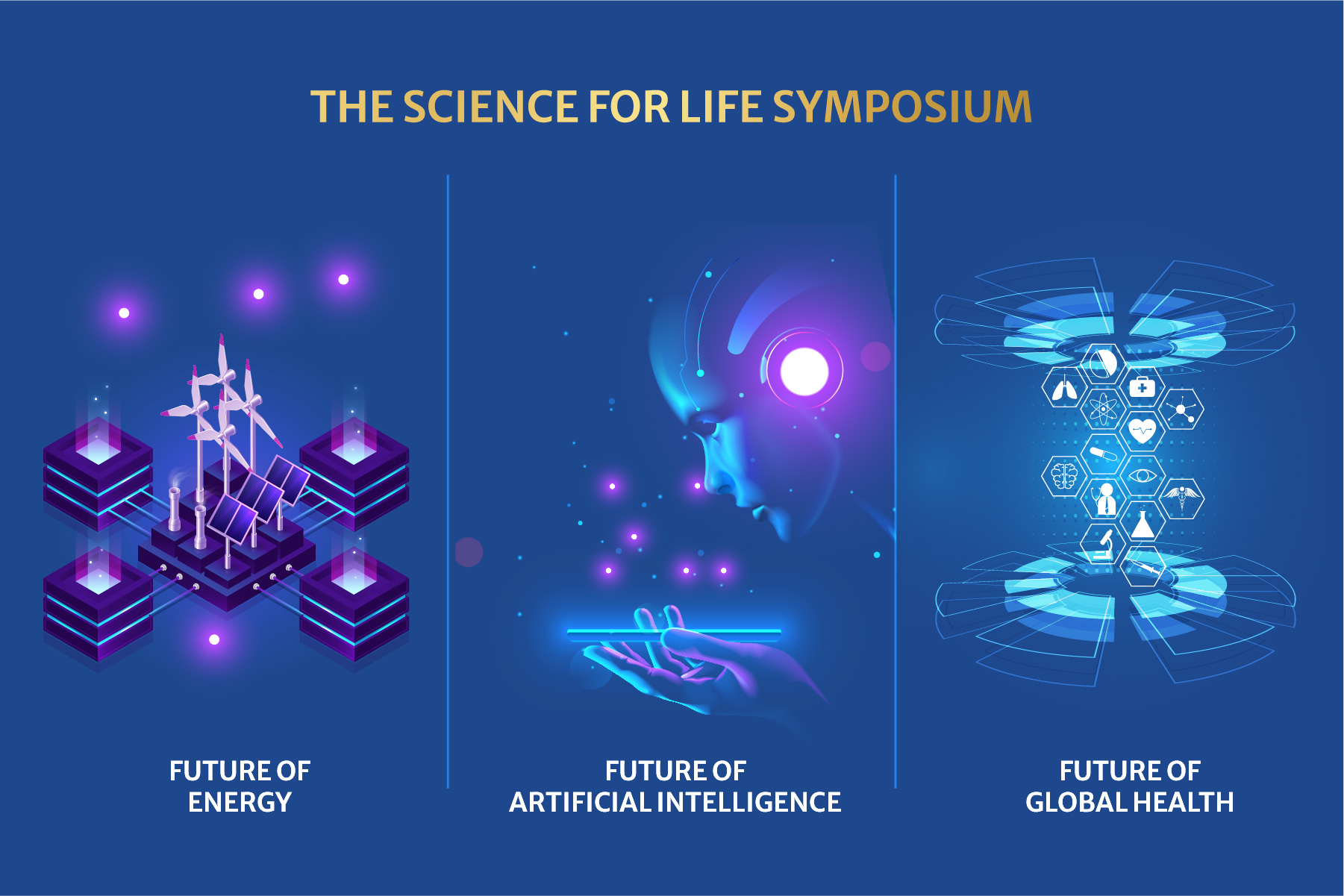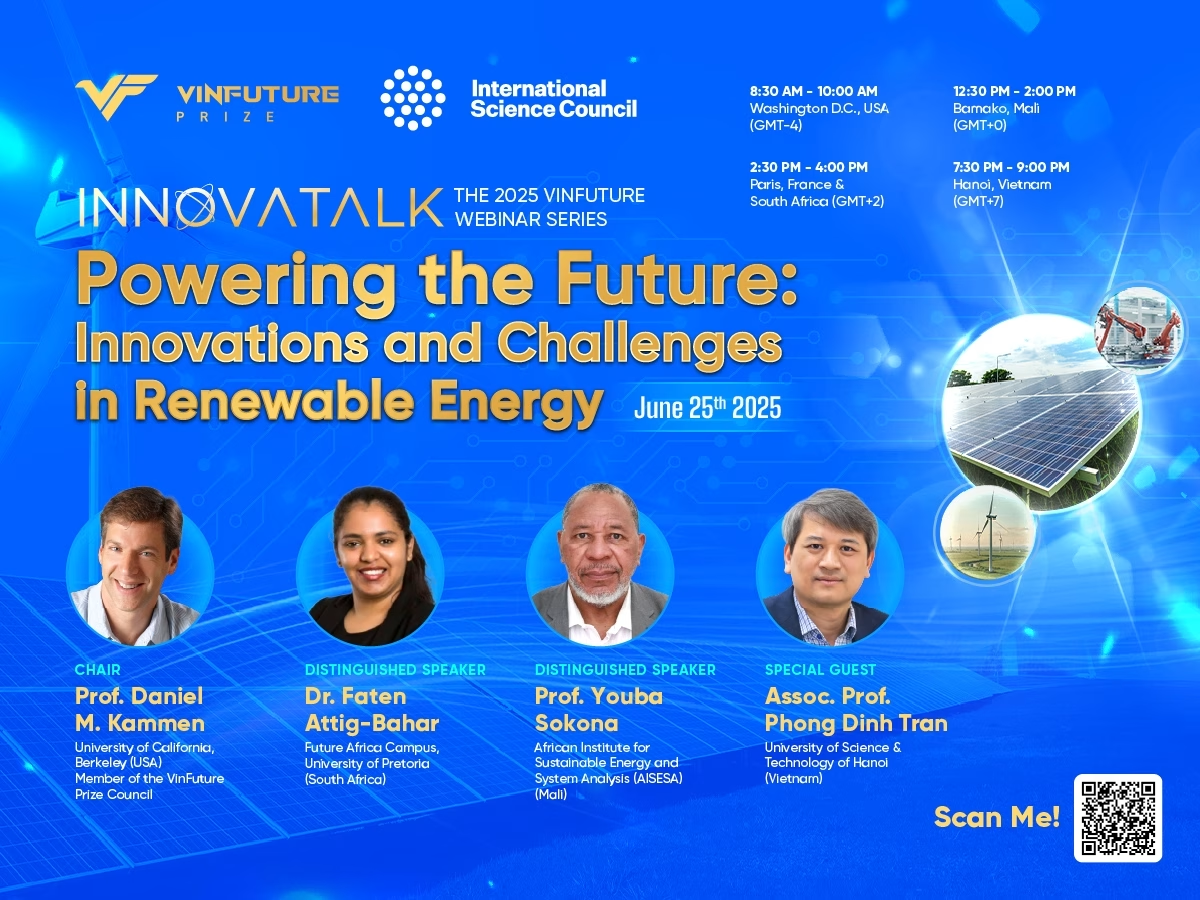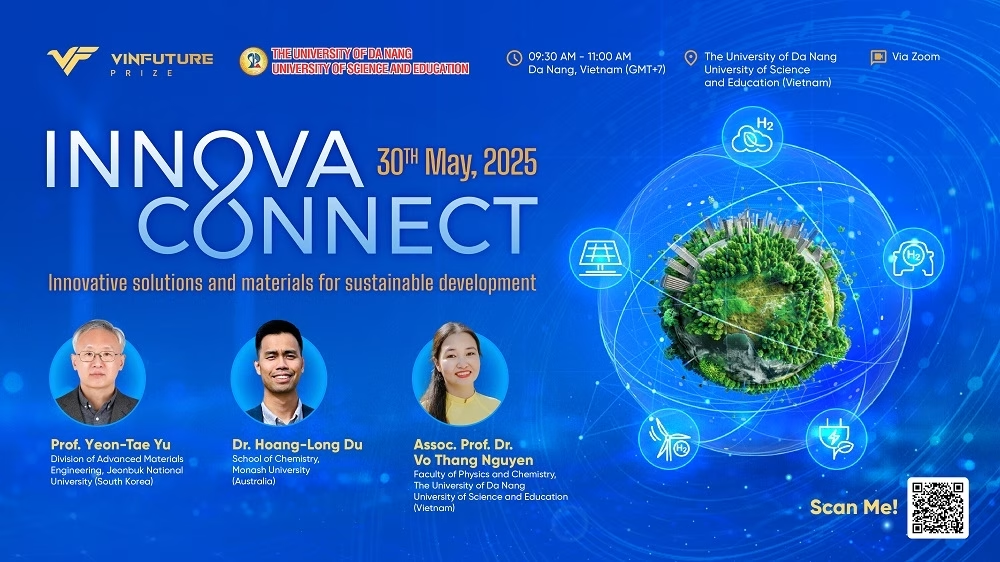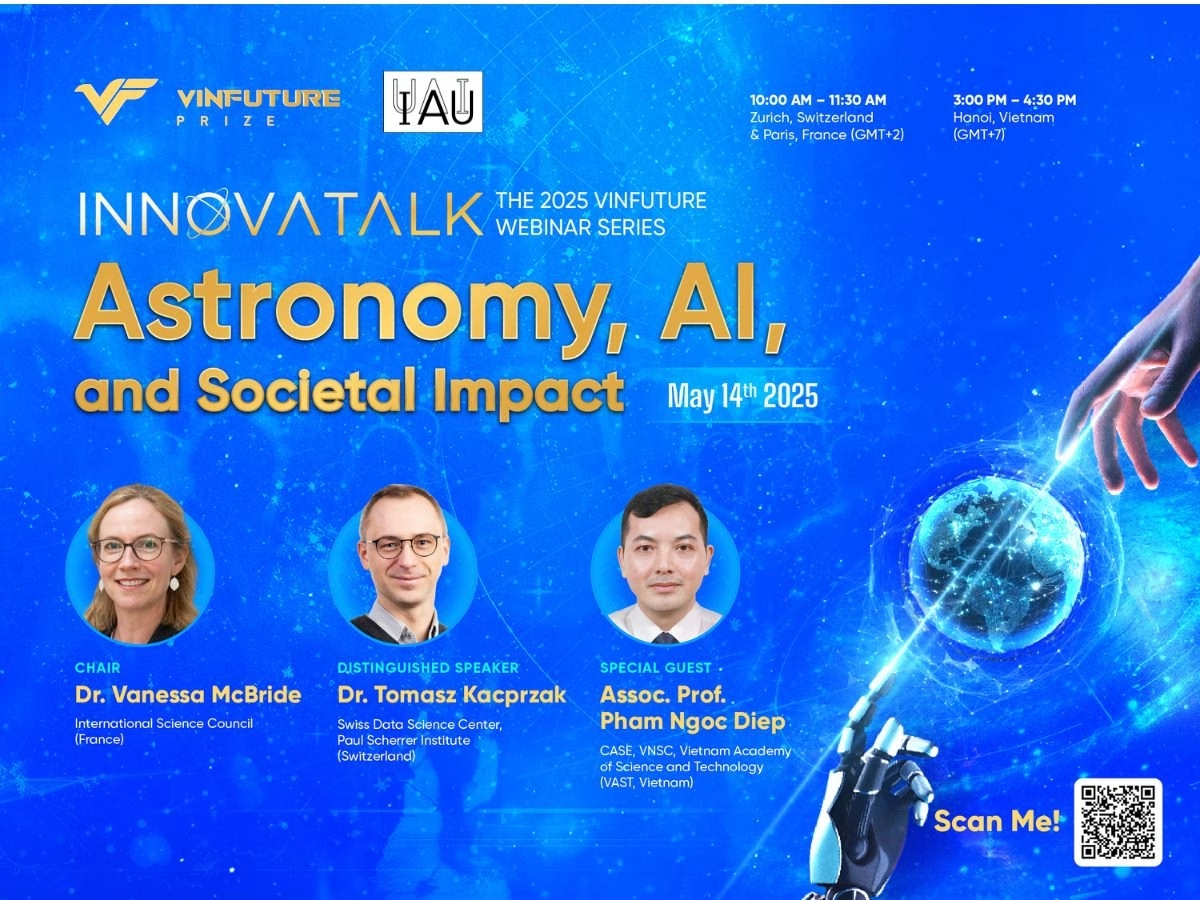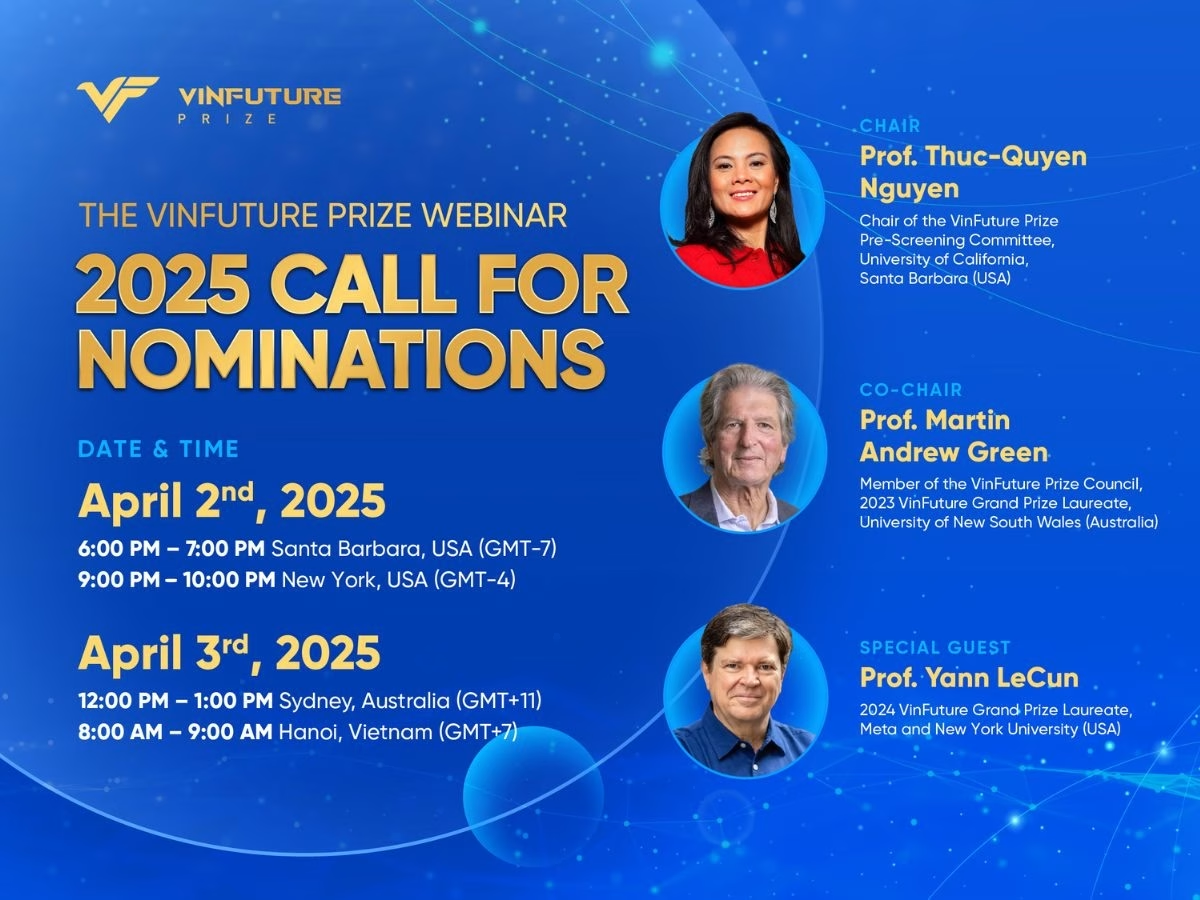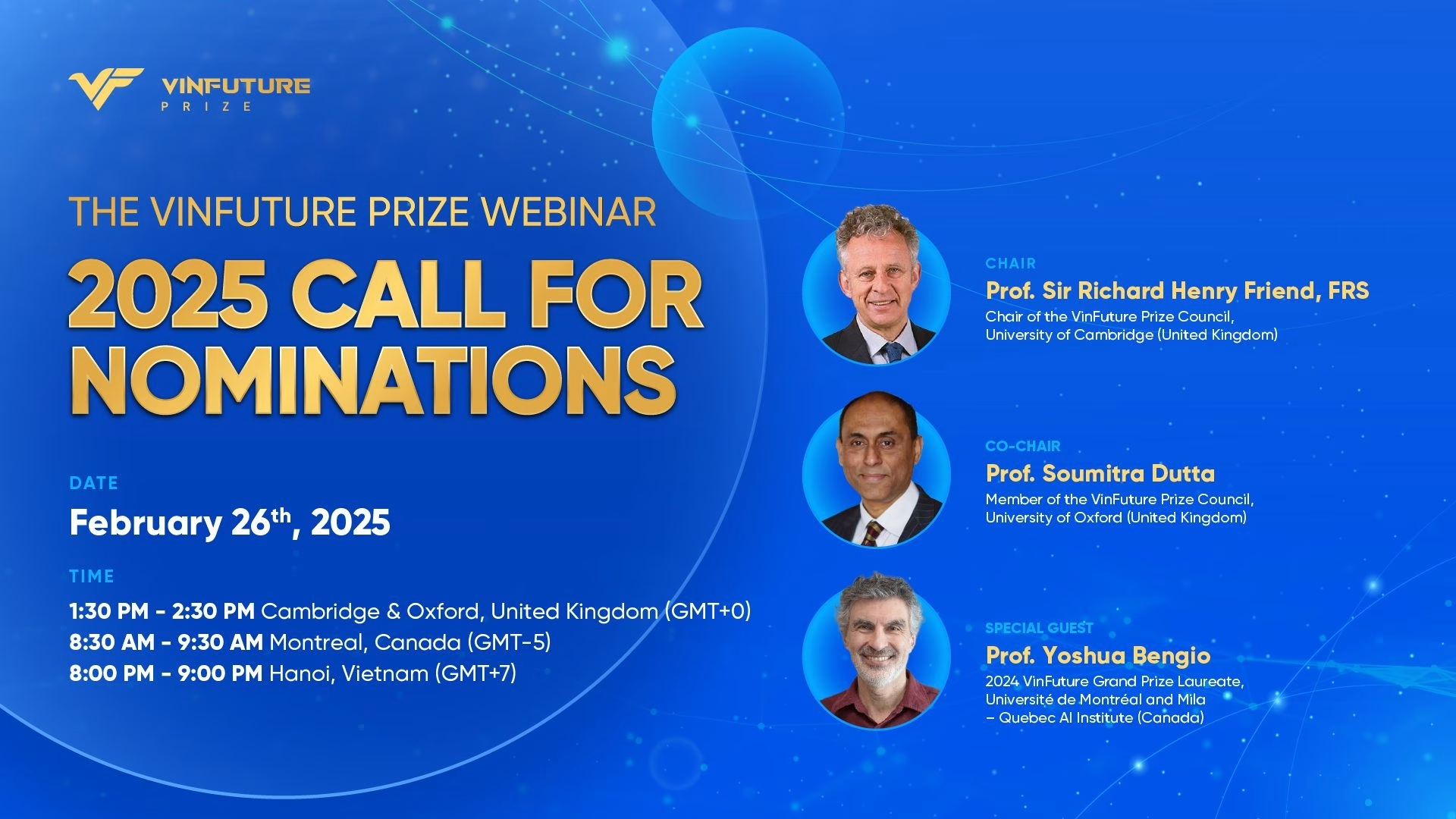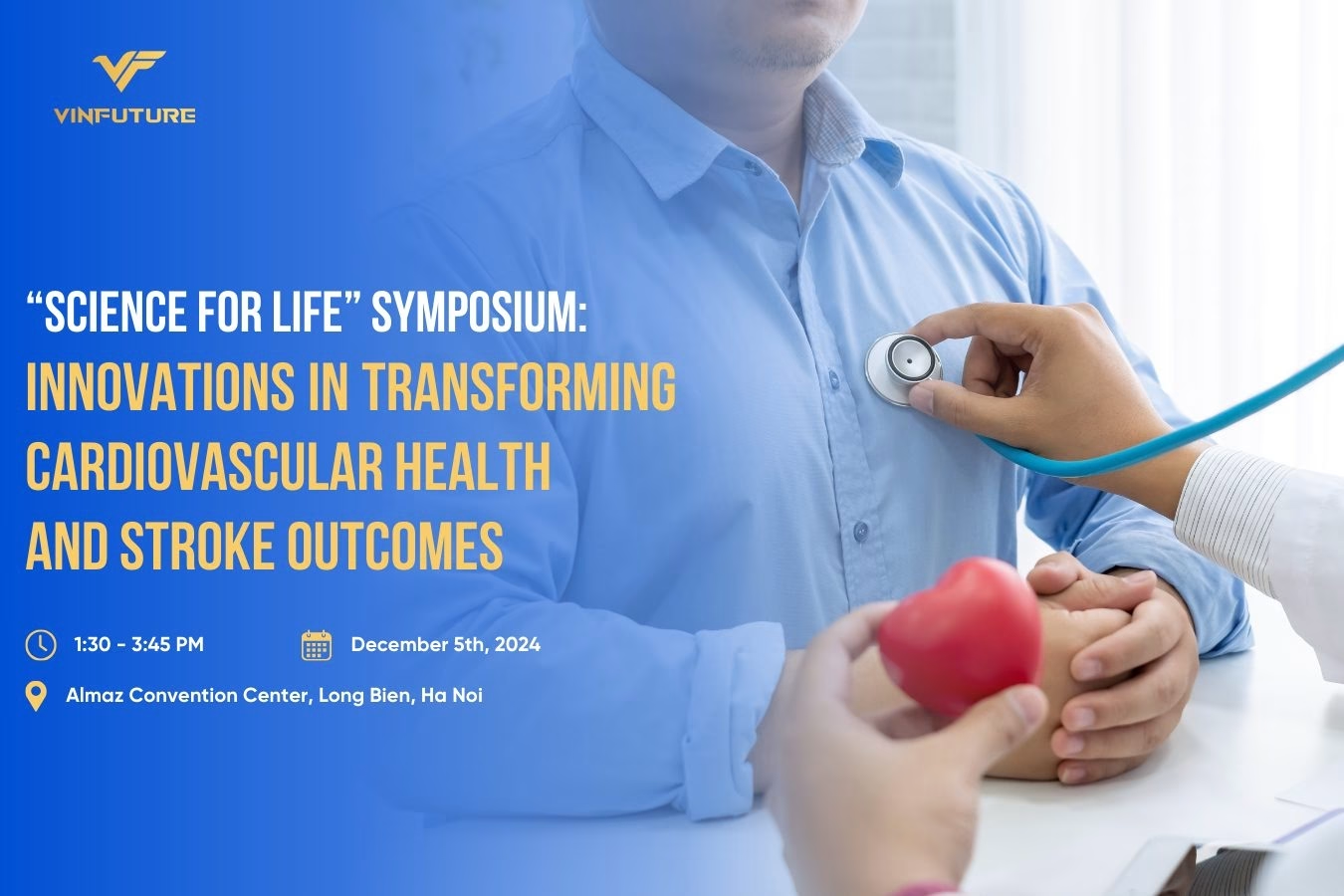The “Science for Life” Symposium will create connections between the Vietnamese sci-tech community and top scientists, policy makers, and entrepreneurs. The all-day symposium will have three consecutive 90-minute panels, each focusing on one of the following critical issues for the future: Future of Energy, Future of Artificial Intelligence and Future of Global Health. The panel in each of these topics will focus on the global issues, upcoming trends, as well as projections of key changes in people’s lives through the intervention of science and technology.
The three sessions of the symposium will each be 90 minutes in length and address three critical themes: the Future of Energy, the Future of Artificial Intelligence, and the Future of Global Health. Each session will focus on future trends as well as projections of key changes in people’s lives with the increasing intervention of science and technology. These topics are pressing issues at the center of the scientific community’s attention, accounting for most nominations in this year’s VinFuture Awards. With the meaningful gathering of eminent scientists, policymakers and leading entrepreneurs, the symposium will promote scientific and technical support to create new breakthroughs, contributing to improving people’s lives and realizing sustainable development for our planet and future generations.
Future of Energy, 9:00 – 10:30 AM
Resources like coal and oil that are used to generate energy are not limitless. The emergence of new industries and rapid urbanization have accelerated the shortage of energy, especially clean energy. The production of solar energy and hydroelectric energy remains expensive, making it difficult for average households and consumers to access. What will be the trend of global energy? What will be the source of future clean energy? Which technology will contribute to solving global warming? What is the key to making energy affordable for all?
Scientists will discuss advancement in science, its equality of access, its real-world applicability, and our responsibilities as citizens in the field of energy.
Chair: Professor Sir Richard Henry Friend, FRS – Chair of the Prize Council – University of Cambridge, United Kingdom, Winner of the 2010 Millennium Physics Prize for his work on plastic electronics. He is one of the world’s most influential physicists and was knighted for “Services to Physics” in the 2003 Queen’s Birthday Honours List.
Guest of Honor: Leader of the Ministry of Science and Technology.
Panelists:
- Professor Gérard Albert Mourou, École Polytechnique Palaiseau, France, Winner of the 2018 Nobel Physics Prize for his work on generating ultrashort high-intensity laser pulses without destroying the amplifying material. He is one of the leading scientists in electrical engineering and laser.
- Professor Sir Kostya S. Novoselov, University of Manchester, Winner of the 2010 Nobel Physics Prize for his breakthrough experiment in graphene. He is one of the world’s most influential scientists and most cited scientists and is well-known for being the youngest Nobel Physics Laureate in the Prize’s history since 1973, receiving the honor at just 36 years old. (Online participation)
- Professor Nguyen Thuc Quyen, Director of the Center for Polymers and Organic Solids (CPOS) at the University of California, Santa Barbara (UCSB). She is among the Top 1% Highly Cited Researchers in Materials Science by Clarivate Analytics and Thomson Reuters from 2015 – 2018 and recipient of the Alexander von Humboldt Research Award for Senior Scientists.
- Professor Antonio Facchetti, Professor of Chemistry at Northwestern University, and Chief Technology Officer at Flexterra. He is one of the leading chemists in the field of organic optoelectrics. He holds over 160 patents and has authored over 430 academic papers. He was awarded the Gold Giulio Natta Medal of the Italian Chemical Society for his work in electronic materials.
Future of Artificial Intelligence: 11:00 AM – 12:30 PM
The world is ever-changing. The Fourth Industrial Revolution, especially with its advancement in artificial intelligence, is having an increasingly greater impact on human lives. Artificial Intelligence (AI) is now present in all aspects of life, from health and education to shopping and leisure. Have advancements in AI really improved our quality of life? How will AI give some countries a competitive advantage and reduce the development gap? What are the inherent risks and moral issues that we should consider?
Scientists will discuss advancement in science, its equality of access, its real-world applicability, and our responsibilities as citizens in the field of AI.
Chair: Dr. Padmanabhan Anandan, Founder of US-based AI Matters Advisors LLC and Chairman of the Governing Board at Telangana AI Mission (T-AIM). He was the Founder and Managing Director of Microsoft Research India and the Vice President of Adobe Research with his research in visual motion analysis, video surveillance, and 3D scene modeling from images and video.
Guest of Honor: Leader of the Ministry of Information and Communications.
Panelists:
- Professor Leslie Gabriel Valiant, Thomas Jefferson Coolidge Professor of Computer Science and Applied Mathematics at Harvard University. He was awarded the A.M. Turing Award in 2010 for work in machine learning, computational complexity and parallel computation, having been described by the ACM as a heroic figure in theoretical computer science and a role model for his courage and creativity in addressing some of the deepest unsolved problems in science. (Online participation)
- Professor Jennifer Tour Chayes, Dean of the School of Information and Associate Provost of Computing, Data Science, and Society at UC Berkeley; Managing Director of three Microsoft Research centres in Cambridge, New York and Montreal; Fellow of the American Academy of Arts and Sciences, and member of the National Academy of Sciences. (Online participation)
- Professor Albert P. Pisano, Dean of the Jacobs School of Engineering at the University of California San Diego (United States). He is co-inventor of over 20 patents and co-author of over 300 archival publications in MEMS. He is a Fellow of the American Society of Mechanical Engineers and the National Academy of Engineering. In 2008, he was named one of the 100 Notable People in the Medical Device Industry by Medical Devices and Diagnostic Industry (MD&DI) Magazine.
- Professor Vu Ha Van, Professor of Mathematics at Yale University, United States; Prof. Vu received the Polya Prize from the Society of Applied and Industrial Mathematics and the Fulkerson Prize from the American Mathematical Society. As scientific director of VinBigData, he has led several research projects leading to high-tech products in Vietnam, such as his mathematics genealogy project that decoded the genes of 1000 non-related Kinh individuals or Vivi virtual assistant. Concurrently, he is the scientific director of VinIF which has created positive impacts on promoting scientific research and high quality human training at Vietnamese universities.
- Xuedong David Huang, Microsoft Technical Fellow and Chief Technology Officer overseeing Microsoft Azure AI engineering and research, covering Microsoft’s core perceptive and cognitive AI pillars (Speech, Computer Vision, Natural Language, and Decision). He holds 170 patents in the United States that have great influence over billions of global consumers through Azure AI. (Online participation)
- Bui Hai Hung, Founding Director of VinAI Research. He is an expert in machine learning and AI with 10 patents and approximately 100 publications in well-respected IT & AI journals. Before founding VinAI, he had hold important positions at Google DeepMind, Adobe Research, AI Center, and SRI International.
Future of Global Health: 2:00 – 3:30 PM
The world is facing a number of challenges. Among those, our health is being threatened by the Covid-19 pandemic. Besides the pandemic, other factors are causing frequent negative impacts on people’s quality of life and life expectancy, such as an aging population, urbanization, unhygienic food products, contaminated water, polluted air, stress, and others. In this context, what will be the trend of global health? How can we ensure a healthy life for all? What is the role of the individual in preventing, treating and caring for oneself? Can scientific advances help us all, especially the disadvantaged and those from poor countries with limited access to affordable healthcare?
The invited guest speakers will discuss advancement in science, its equality of access, its real-world applicability, and our responsibilities as citizens in the field of healthcare.
Chair: Professor Dang Van Chi, Scientific Director of the Ludwig Institute for Cancer Research, United States. He is a renowned doctor, researcher, and hematology expert. He received the MERIT Prize from the National Academy of Medicine. He is a member of the U.S. National Academy of Medicine and a fellow of the American Association for Cancer Research Academy.
Guest of Honor: Leader of the Ministry of Health
Panelists:
- Professor Pieter Rutter Cullis, Professor of Medicine and Founding Director of Centre for Drug Research and Development (CDRD), University of British Columbia, Canada. He is well-known for his contributions to the field of Liposomes and Lipid Nanoparticles (LNP). He is a pioneering scientist in genetic treatment using LNP technology.
- Robert C. Green, Director of the Genomes2People Research Program and Founding Director of Brigham Preventive Genomics Hospital, Harvard. He is a leading scientist in community health and medical genetics. He has received the Coriell Award for Scientific Achievement in Personalized Medicine. He is named one of the 25 most influential voices in precision medicine. (Online participation)
- Professor Katalin Kariko, Senior Vice President of BioNTech, and Adjunct Professor at the University of Pennsylvania. She is well-known for her contribution in mRNA technology and mRNA COVID-19 vaccines. She has received the Princess of Asturias Award, the Vilcek Prize for Excellence in Biotechnology, the Breakthrough Prize in Life Sciences, and Lewis S. Rosenstiel Award for Distinguished Work in Basic Medical Research.
- Professor Salim Safurdeen Abdool Karim, Director of the Centre for the AIDS Program of Research in South Africa (CAPRISA), Pro Vice-Chancellor at the University of KwaZulu-Natal, South Africa; Head of the South African Ministerial Advisory Committee on COVID-19; Chair of the WHO’s HIV and Hepatitis Scientific and Technical Advisory Group. He is renowned for his work in epidemiology and infectious diseases, especially HIV, Covid-19, and South Africa’s response to Omicron.
- Professor Quarraisha Abdool Karim, Associate Scientific Director of CAPRISA, Vice-President of the African Academy of Sciences, Chair of the South African National AIDS Council Prevention Technical Task Team. She is renowned for her research in AIDS, Tenefovir gel to reduce HIV transmission to young women and girls in Africa. She received the L’Oreal-UNESCO Award for Women in Science for her relentless effort to help African women fight against HIV and live a better life.
- Professor Drew Weissman, Roberts Family Professor in Vaccine Research at Perelman School of Medicine, University of Pennsylvania. He is a pioneer in Immunology – renowned for his research in safe vaccine development for a variety of diseases. He has been awarded the Princess of Asturias Award, the Breakthrough Prize in Life Sciences, the Lewis S. Rosenstiel Award, the Lasker-DeBakey Clinical Medical Research Award, the Louisa Gross Horwitz Prize and the NIH Special Achievement Award.
